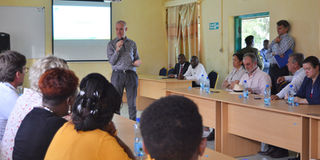How programme by MESPT is aiding the revamping of agricultural training in Kenya
Sponsored by Micro Enterprises Support Programme Trust

An EU delegation visit to Kaguru ATC in Meru, led by Amb Simon Mordue. The delegates were hosted in a hall renovated and furnished by MESPT through the AgriFI programme.
By Evans Ongwae
The AgriFI Food Safety Programme by the Micro Enterprise Support Programme Trust (MESPT) is helping to boost food safety in Kenya.
The programme, funded by the European Union (EU) and the Danish International Development Agency (DANIDA), and implemented in 13 counties across Kenya, has already made significant contributions to the imparting of critical skills and knowledge to the people who handle produce from farm to fork, thereby improving the safety of food on the consumer’s plate.
MESPT is implementing the programme in Kilifi, Nyandarua, Nakuru, Kisii, Bungoma, Kakamenga, Migori, Kiambu, Kirinyaga, Makueni, Machakos, Meru and Embu counties. By addressing the food safety concerns of domestic and international markets, the programme is enhancing the competitiveness of selected agricultural value chains. It focuses on food safety, and plant and animal health.
The programme is guided by two result areas. Result Area 2 seeks to strengthen the capacities of actors along dairy, horticulture and aquaculture value chains through the Agricultural Technical and Vocational Education and Training (ATVET) model. The ATVET model is applied in the capacity-building process and encompasses the curricula development aspect.
Result Area 3, on the other hand, seeks to increase the capacity of the private sector and county governments to implement and enforce standards on animal health, plant health, and food safety.
MESPT began the journey of contributing to agriculture training centres by reviewing the competency-based curricula for dairy, horticulture, and aquaculture, to include food safety elements. The TVET Curriculum Development Assessment and Certification Council (CDACC) approved the curricula. This step was important because even though Agriculture Training Centres (ATCs) may continue to provide training, they can only give internal certificates that cannot be used or transferred for progression in institutions of higher learning.
Secondly, there was a need to focus on developing learning and training guides and trainees’ assessment tools for the various ATVET occupations. These resources were completed and approved by TVET CDACC for use in 2020. It should, however, be noted and appreciated that there are so many teaching and learning (T&L) materials out there, only that they are not customised to the competency-based curricula like the one MESPT developed.
Overall, the programme set out to review four curricula with the aim of addressing the inclination of ATVET centres to theory. This objective aimed at making the centres more oriented to practical skills delivery, and to subsequently address the concern of mismatch between the skills learnt and real application.
Apart from the review of curricula, the AgriFI Food Safety Programme helped revamp 12 previously dilapidated ATCs. The programme supported the centres in terms of capacity development and sustainability plans, amongst other resources needed to address the constraints limiting their operations. These interventions help to reduce food safety skills gap among value chain actors.
The 2017 Ministry of Agriculture Capacity Building Strategy for Agriculture Sector noted capacity gaps at three levels: individual, institutional and enabling environment.
At individual level, the ministry identified inadequate knowledge, skills and competencies among technical staff and service providers, as the critical gaps. Further, the staff did not have adequate hands-on and pedagogy skills to transfer the same to value chain players. Notably, pedagogy skills are a requirement for accreditation.
At the institutional level, the ministry listed lack of harmonised curricula for agricultural vocational training and qualification framework, and low participation of youth in agriculture as the key impediments.
At the enabling environment level, the legal and regulatory frameworks and political commitment were found to be inadequate to drive the sector forward.
_______
SIDE-BAR
Programme transforms 13 ATCs to model ATVET centres
The AgriFI Food Safety Programme by Micro Enterprise Support Programme Trust has supported the accreditation and licensing of the trainers, and infrastructure development in 13 ATVET centres across Kenya.
The interventions are aimed at making the ATVET centres attractive and profitable training institutions.
The programme conducted an assessment of all the 13 centres to establish their appropriateness to deliver training. From the assessment, infrastructure emerged as a common challenge.
Consequently, the programme offered infrastructure support to the centres in 2019 through to 2020. Key beneficiary institutions were Embu ATC, Kamweti ATC in Kirinyaga, Machakos ATC, Miyare in Migori, Mabanga in Bungoma and Waruihu in Kiambu, plus the selected seven model ATVET centres of Kaguru ATC in Meru, Mtwapa ATC in Kilifi, Kwa-Kathoka ATC in Makueni, Njabini ATC in Nyandarua, Nakuru ATC, Kisii ATC, and Bukura ATC in Kakamega.
The support for Embu and Kamweti ATCs was towards furniture and ICT equipment. Machakos ATC infrastructure support involved the renovation of a dilapidated training hall.
The seven model ATVET centres were selected based on the willingness of the counties to provide additional support for developing the needed infrastructure. The counties were Kakamega, Kisii, Kilifi, Nakuru, Meru, Makueni, and Nyandarua. The respective model regional ATVET centres received additional resources to address food safety knowledge gaps and stimulate private sector engagement.
The support commenced in 2020 and will be completed this year. This phase of investment was focused on the development of infrastructure of the targeted value chains of dairy, horticulture, and aquaculture.
A complete version of this report can be downloaded here.


